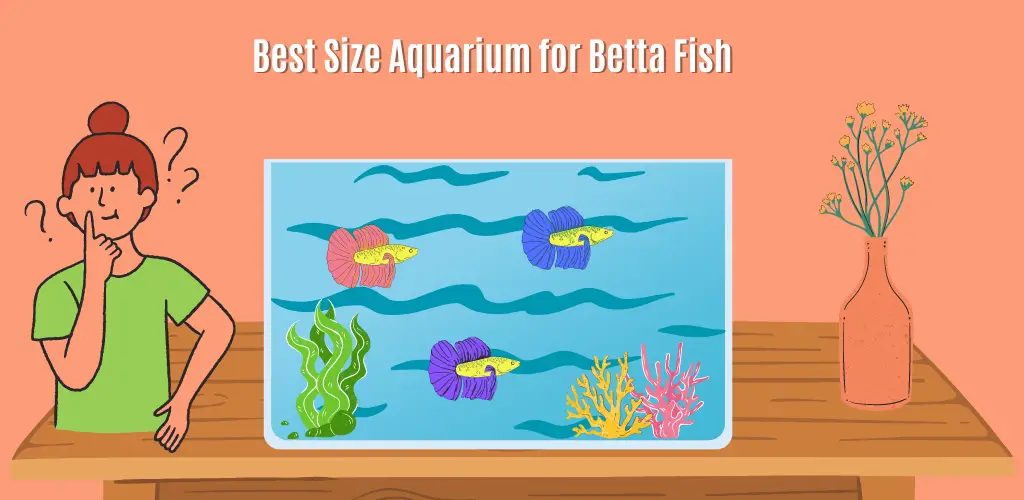Betta fish, or Siamese fighting fish, are popular freshwater fish known for their vibrant colors and long, flowing fins. Native to the rice paddies, shallow ponds, and slow-moving streams of Southeast Asia, bettas are renowned for their beauty and unique behavior. In this article, we’ll delve into the intricacies of betta fish care, focusing on the importance of choosing the best aquarium size for Betta Fish.
In this article, Learn about the best size aquarium for betta fish to provide them with a comfortable and healthy environment. Find out how the aquarium size can impact the well-being and behavior of betta fish, ensuring their optimal care in captivity.
Understanding Betta Fish
Habitat and Behavior
In their natural habitat, betta fish live in warm, shallow waters with dense vegetation. They are labyrinth fish, which means they have a specialized organ called the labyrinth organ that allows them to breathe atmospheric air. This adaptation enables bettas to survive in oxygen-deprived waters, where other fish might struggle. Betta fish are solitary by nature and are best kept alone in an aquarium to prevent aggressive behavior towards other fish.
Diet and Feeding Habits
Betta fish are carnivorous and thrive on a diet rich in protein. In captivity, they can be fed various foods, including high-quality betta pellets, live or frozen bloodworms, brine shrimp, and daphnia. Providing them small, frequent meals is essential to prevent overeating and ensure they receive adequate nutrition.
Choosing the Best Size Aquarium for Betta Fish
When choosing the best size aquarium for betta fish, it’s essential to consider their unique needs. Unlike goldfish, bettas require specific conditions tailored to their long, delicate fins. They thrive in environments with low water flow and plenty of resting spots. Since bettas are solitary creatures, keeping them alone is best to prevent conflicts between males and potential aggression among females. Your betta’s tank should have a dependable filter, heater, and the same care and attention you would give to any other fish.
Factors to Consider
Several factors should be considered when selecting an aquarium size for your betta fish. These include the size of the fish, the need for swimming space, and the ease of maintenance. A larger aquarium provides more stable water conditions and allows for better filtration and temperature regulation.
Ideal Tank Size
The best size aquarium for betta fish is a minimum of 5 gallons (19 liters). However, larger tanks, such as 10 gallons (38 liters) or more, are preferable as they offer more room for the fish to swim and explore. A larger tank also provides a more stable environment with less fluctuation in water parameters.
Advantages of a Larger Tank
A larger tank has several benefits:
- Enhanced Water Quality: More water volume means that toxins like ammonia and nitrite are diluted, making it easier to maintain a stable and healthy environment.
- Temperature Stability: Larger volumes of water are less prone to rapid temperature changes, which is beneficial for the betta’s health.
- More Enrichment: Additional space allows for more decorations, plants, and hiding spots, enriching the betta’s environment and promoting natural behaviors.
- Improved Aesthetics: A bigger tank can house a wider variety of plants and decorations, creating a visually appealing setup that mimics the betta’s natural habitat.
Setting Up the Aquarium
Tank Requirements
When setting up an aquarium for betta fish, it’s essential to provide a suitable environment that mimics their natural habitat. This includes a secure lid to prevent them from jumping out and a gentle filter that won’t create strong currents. Decorate the tank with live or silk plants, rocks, and caves for hiding spots and enrichment.
Aquarium Decor
Betta fish are attracted to bright colors and enjoy exploring their surroundings. Decorate the tank with various plants and decorations to create an engaging environment for your Betta. Avoid sharp or rough decorations that could damage their delicate fins.
Water Parameters
Maintaining stable water parameters is crucial for the health of betta fish. Keep the water temperature between 75-82°F (24-28°C) using a heater, and ensure the pH level stays between 6.5-7.5. Regular water testing and partial water changes are essential for keeping the water clean and maintaining optimal conditions for your betta fish.
Maintaining the Aquarium
Cleaning and Maintenance
Regular maintenance is vital to keeping your betta fish healthy and happy. Perform 25-50% weekly water changes to remove waste and replenish essential nutrients. Use a siphon to clean the substrate and remove accumulated debris. Keep the filter clean and replace the filter media to maintain optimal filtration.
Monitoring Betta Health
Regularly observe your betta fish for signs of stress or illness. Look for changes in behavior, such as lethargy or lack of appetite, and physical symptoms like clamped fins or discoloration. Keeping a close eye on your betta’s health will allow you to address any issues promptly.
Algae Control
Algae can be a common problem in aquariums. To keep algae growth under control, avoid placing the tank in direct sunlight and limit the amount of light the tank receives to about 8-10 hours a day. Introducing algae-eating organisms, such as snails or shrimp, can also help maintain a clean tank.
Conclusion
Choosing the best size aquarium for your betta fish is crucial for their well-being and longevity. A spacious and well-maintained tank provides a healthy environment where they can thrive and display their natural behaviors. By understanding their needs and providing them with the right conditions, you can ensure a happy and fulfilling life for your betta fish.
FAQs About Betta Fish and Aquariums
- How often should I feed my betta fish? Feed your betta fish small portions 2-3 times a day, adjusting the amount based on how much they can consume in 2-3 minutes.
- Do betta fish need a heater in their aquarium? Yes, betta fish are tropical and require a stable water temperature between 75-82°F (24-28°C).
- Can betta fish live in small bowls? While betta fish can survive in small containers, they thrive in larger tanks of at least 5 gallons (19 liters) with proper filtration and heating.
- Do betta fish need a filter in their tank? A gentle filter is recommended to clean the water and provide aeration without creating strong currents.
- How often should I change the water in my betta fish tank? Change 25-50% of the water in the tank every week to maintain good water quality.
- What type of plants are best for betta fish tanks? Live plants such as Java fern, Anubias, and Marimo moss balls are excellent choices as they provide natural hiding spots and help maintain water quality.



